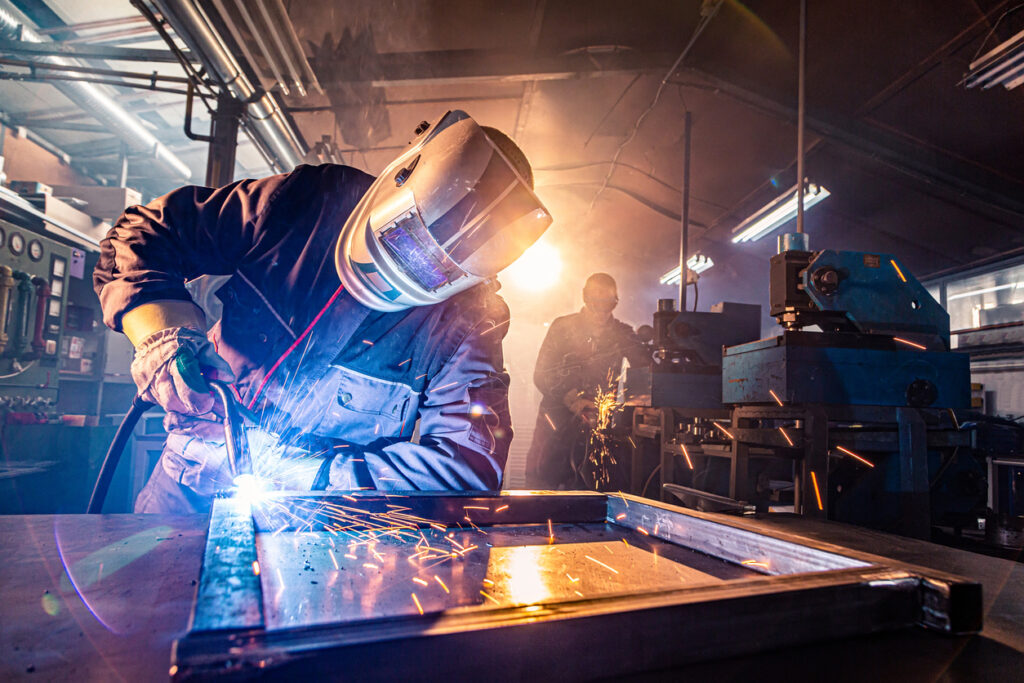Shortage of skilled labour in production: causes, effects and solutions
The shortage of skilled labour is hitting the manufacturing industry particularly hard. In almost all branches of industry, there is a lack of qualified specialists. This shortage not only has an impact on the economy, but also on the Germany's capacity for innovation. Why is that? Because production is the backbone of our industry.
In this article we talk about the industrythat are most affected. We take a look at which Professions are missing and why. We also check which Measures Company against the shortage of skilled labour can take. And of course we ask the question: Are international specialists the solution?
- Skilled labour shortage in production - affected industries and professions
- Causes of the shortage of skilled labour.
- Impact on the companies concerned
- Solutions and measures to combat the shortage of skilled labour
- Skilled workers from abroad as a solution to the skills shortage
- Favourite countries of origin for foreign skilled workers
- Requirements and challenges for the integration of foreign skilled workers
- Potential and limits of immigration as a solution to the shortage of skilled labour

Which sectors and professions are most affected by the skilled labour shortage?
At every stage of production there are many Sectorsespecially under the shortage of skilled labour suffer. Here we show you a Industry overview. These include, among others:
- manufacturing and
- automotive industry
- electrical engineering
- Chemical industry
- Food production
These sectors are namely the crux of the German economy, dif If there is a shortage of labour here, the accordingly huge consequences.
What are so the professions concerned? They are even not only engineers, but also specific technical specialists who are in short supply. Professions such as machine and plant operators, industrial mechanics, electronics technicians as well as general Welders are in short supply. In addition there are also bottlenecks in quality control. These are professions that only with difficulty are to be replaced, because they require specialised knowledge and qualifications.
According to statistics from the Federal Employment Agency, jobs in these professions remain unfilled for an average of 120 days. and that is almost twice as long as in other professions. That shows, how clear The problem is.
What are the main causes of the skills shortage in production?
The shortage of skilled labour is anything but a coincidence. rather the result of a combination of several factors. A look at demographic trends already reveals a lot: the German population is ageing rapidly, while at the same time the birth rate is falling steadily. This development is accompanied by consequently The number of young people entering the labour market is also falling massively. More and more skilled workers are taking their well-deserved retirement - and unfortunately the next generation is not being recruited. accordingly often fail. A vicious circle that noticeably affects production year after year.
Education and career choice beyond that also make a major contribution to the shortage of skilled labour. Young people are increasingly focussing on academic professions, whereby technical professions and manual labour often fall on deaf ears. A degree in engineering or a job in marketing sounds far more attractive to many than an apprenticeship as an industrial mechanic. The problem? Fewer and fewer skilled workers are being trained for production. And If the number of apprentices decreases, there will naturally also be a lack of the necessary professionals on the shop floor in the following years.
Why complicate modern technologies and working conditions?
In addition, the Technological change added. The digitisation and Automation are progressing andare turning the production landscape on its head. In the past, it may have been enough to be able to operate a machine, but today many tasks require specialised technology knowledge and digital skills. The production industry urgently needs people with expertise in modern technologies - but training centres are lagging behind when it comes to the necessary digital skills. This creates gaps that are difficult to close.
After all, the working conditions in production play a major role. Shift work, physically demanding tasks and often a hectic pace are part of everyday life here. For many young people who prefer flexible and "work-life balance-friendly" jobs, these conditions are an exclusion criterion. Why enter an industry that is strenuous and challenging when there are jobs that promise more flexibility and less physical strain? Competition for labour is thus becoming increasingly fierce - and production often loses out.
How does the shortage of skilled workers impact affected companies?
Production delays are probably one of the most painful consequences. Because When teams are chronically understaffed, the flow of work slows down considerably. And that remains natural not without consequences. Delays add up and delivery deadlines cannot be met, so that in the worst case scenario, disgruntled customers may jump ship. What is a nuisance for the customer can end dramatically for the company, especially as not only are orders at risk, but also reputation and customer loyalty.
The costs are rising also noticeablewhen there is a shortage of skilled labour. In order to to close production gaps, many companies resort to temporary labour or overtime. But this is expensive and eats into already tight profit margins. In addition The search for qualified specialists also costs money and ties up resources that are not available for day-to-day business. In total the shortage of skilled labour in production becomes a burden on the entire company balance sheet.

But the shortage of skilled labour doesn't just cost time and money, but The quality of the products also often suffers as a result. Without experienced production staff, the error rate increases, whereby quality standards cannot be met. As a result This leads to an increase in returns and complaints, which destroys customer trust. It's actually a vicious circle: the poorer the quality, the weaker the customer loyalty, and thus the more difficult it will be to remain competitive in the market.
What are the other disadvantages?
What about innovation? Here too many things fall by the wayside. Without suitably trained staff, many companies lack the ideas as well as general the knowledge of how new processes can be developed, in order to to keep pace with new technological trends. This could make production facilities more efficient, modern and automated, but Without the right specialists, many of these visions remain stuck in theory. As a result companies not only lag behind but, in the worst case, lose their competitive edge.
One example makes this problem particularly clear: This is how A renowned mechanical engineering company in Baden-Württemberg was recently forced to postpone several major orders. The reason? There was simply a lack of industrial mechanics, in order to to manufacture and deliver the machines on time. Meanwhile the competition struck cold and secured the orders. A clear competitive disadvantage that shows, how urgent the production industry is dependent on new solutions, for the long term the shortage of skilled labour.
Here is some interesting information on mechanical engineering in production: "The myth of mechanical engineering studies: "Nothing is too difficult for an engineer"
There is also the branch of production specialists in chemistry. Find out more here: Chemical production specialist - training - profession.
What measures can combat the skilled labour shortage?
How canow can companies respond to the shortage of skilled labour? Here are some promising approaches:
- Training campaigns: More apprenticeships and closer dialogue with schools and vocational colleges are necessary. Apprentices must be encouraged to take up technical professions at an early stage.
- Further training for existing employees: The rapid development of technologies requires regular training programmes. Companies could prepare their employees through targeted training programmes. up to date.
- More attractive working conditions: Flexible working hours, better pay and company health management canmake jobs in production more attractive.
- Using digitalisation: The introduction of Robotics and artificial intelligence can take over routine tasks and free up more time for more demanding tasks.
- Rethink recruitment strategies: actively search for talent and approach potential specialists.

Are foreign skilled workers the solution to the skills gap?
In view of the shortage of skilled labour foreign labour force is becoming increasingly important. But why should companies hire skilled workers from abroad?place?
- Advantages: International specialists often bring new perspectives and a higher level of motivation. They have specialised skills that are lacking in this country. In addition, many of them have excellent technical training and are ready to work in production.
- Challenges: Of course there are also Obstacles such as language barriers and cultural differences. However, companies can overcome these challenges through language courses and intercultural training.
According to a Study by the Bertelsmann Stiftung is the share foreign skilled labour in the production has risen by 25 % in recent years. A clear sign that the Recruitment abroad worthwhile.

Which countries are top sources for foreign skilled workers?
Which Countries are particularly interesting for German companies? Here a Overview:
- EU countries: Vany companies rely on skilled labour from Poland, Slovakia, Romania and Bulgaria. These countries have a well-trained labour force, and mobility within the EU makes it easier to enter Germany.
- Non-EU countries: India and the Philippines are known for their skilled labour in technical professions. Mexico and Vietnam are also considered promising countries.
- China: Tuee training in technical professions is highly valued in China, and many skilled workers are willing to move to Europe.
What are the key requirements for integrating foreign skilled workers?
The Integration von international skilled labour poses certain challenges for companies. But with the right measures master this:
- Visa and work permits: A work permit is required for skilled workers from non-EU countries. The Skilled Labour Immigration Act facilitates this process.
- Language requirements: Language courses are often essential for foreign skilled workers, especially in production. Companies can provide support here.
- Recognition of qualifications: Tuee foreign qualifications often have to be recognised first. This process can take time, but is necessary to ensure that the skilled workers have the necessary skills.
- Support and integration: Buddy programmes, mentoring and intercultural training make it easier to settle in.
What are the opportunities and limits of immigration as a solution to the labour shortage?
The Immigration can not all Problems solve. However, it is an important Supplement to the internal measures. But what is the Long-term perspective?
- Sustainability: The Recruitment abroad should be realised through an improved Education and higher Incentives for technical professions should be added. This is the only way to create a long-term solution.
- Risks: Too strong Dependence on international skilled labour can network the further training of domestic workers.neglect.
- Vision of the future: Companies and politicians must work together to keep production in Germany stable and competitive.to keep the company competitive.
Innovative strength through diversity: How do international specialists enrich production?
The Integration of international specialists into the Production not only relieves the burden on personnel, but also brings new innovative strength. Why? Diversity in the teams promotes creativity and encourages the exchange of different ways of thinking. Employees from other cultures and with different professional backgrounds bring new methods to the table. Problem solution and often bring valuable technical perspectives from their home country. They enrich the production processes with ideas that would probably not have been expressed by traditional teams.
Research results prove this effect. Because Diversity within a company has been proven to be more responsive to market changes and more innovative. So that can provide evidence of the successful implementation of new production techniques and working methods that foreign skilled workers bring with them from their training and experience. Last but not least a combination of local knowledge and international approaches often leads to new creative solutions, through the efficiency and quality of production can be increased.
Another argument in favour of diversity and international expertise could be that an internationally oriented team is much better equipped to deal with global partners, customers or suppliers. This is an obvious advantage in the age of globalisation. So benefitn companies twice over - through direct expertise and improved market adaptation. Companies that actively promote diversity and invest in intercultural training thus create an attractive and innovative working environment that also attracts young talent in the long term.remains relevant.
Automation and artificial intelligence: replacement for skilled labour or support?
Automation and Artificial intelligence has long since ceased to be the sound of the future in the manufacturing industry. More and more companies are relying on intelligent machines that can take over routine and physically demanding tasks. Whether technology can actually make up for a shortage of skilled labour is more likely not the case - at least not as a whole. Instead, machines and AI are becoming an effective support for human specialists by reducing their workload and making their work more effective.
How do AI and robotics make production more efficient?
Robots are increasingly taking over light assembly tasks or quality control in production systems. In turn, skilled workers gain time for more complex tasks that require analyses and problem solving. AI-supported systems that analyse large amounts of data from production processes in real time also support skilled workers. This enables them to detect potential sources of error before they lead to production downtime. Human employees thus become analysts and decision-makers who control and optimise technical processes.
Another advantage of the Human-machine co-operation is that companies can react more flexibly to market changes. This allows companies to The shortage of skilled labour means that production can be maintained or even expanded. Looking to the future, it is likely that production will remain hybrid: Humans and machines will work together in close cooperation, with skilled workers continuing to provide the expertise and decision-making. AI and robotics will continue to take over routine tasks. Only this hybrid way of working can be the solution for alleviating the shortage of skilled labour in the long term and securing the innovation potential of production.
How can production processes be optimised through targeted personnel development?
The best answer to the shortage of skilled labour in the manufacturing industry, however, is clearly atargeted personnel development in the companies. This enables production employees to acquire new skills that better meet changing requirements through needs-based training and further education. In addition, adapting existing qualifications to the modern requirements of production helps to close the gap between traditional and digital skills, whereas the new skills are not needed.nd quality and efficiency of the production processes are ensured.
Skilled labour shortage in production - How can a sustainable production culture be promoted?
In view of the increasing shortage of skilled labour, a sustainable production culture therefore increasingly important. A working environment that emphasises appreciation, security and work-life balance increases on the one hand Employee loyalty and on the other hand it makes jobs in production more attractive. Through measures such as health programmes, flexible shift models and a conscious approach to workloads, production can increase its attractiveness for existing and potential skilled workers. clear increase. A sustainable production culture promotes also innovative strength and the willingness to continuously improve - two decisive factors, for the long term in a highly competitive environment.
How can efficiency be increased through intelligent shift planning and automation?
The manufacturing industry is facing the challenge of coping with the shortage of skilled labour, without jeopardise productivity. Intelligent shift planning in connection with modern automation solutions can significantly increase efficiency and at the same time relieve the burden on existing employees. In particular Through the strategic use of automation for repetitive, physically demanding tasks, companies can free up their skilled labour for more complex activities. Balanced shift planning that responds to the needs of employees increases beyond that job satisfaction and reduces staff turnover. The intelligent organisation of work processes is therefore a sustainable solution to the challenges posed by the shortage of skilled labour in production.
What attractive career paths are there for attracting and retaining production specialists?
In order to counteract the shortage of skilled labour in the long term, it is therefore It is crucial to create clear and attractive career paths in production. Because If production employees see prospects for career advancement and targeted further development, they are more motivated to stay with the company and at the same time to play an active role. The introduction of career levels as well as general The opportunity to specialise or take on management tasks can increase the attractiveness of jobs in production. clear increase. In this way such development opportunities create a win-win situation in which companies can rely on motivated specialists, which in turn contribute to long-term stability and innovative strength.
How can workstations be adapted to ergonomic standards?
Due to the increasing shortage of skilled labour, there will be therefore It is becoming increasingly important to design production workstations ergonomically, all the more minimise the physical strain on employees. Companies that invest in ergonomic work equipment as well as general The company not only protects the health of its skilled workers by investing in customised work processes, but also increase the productivity and efficiency of their processes. Ergonomic measures can reduce sickness-related absences, what just is particularly important in times of a shortage of skilled labour. In addition the implementation of ergonomic standards shows employees that the company values their safety and well-being, which in turn has a positive effect on job satisfaction and loyalty.
How does cooperation with educational institutions for the promotion of young talent work?
Proactive collaboration with educational institutions is therefore another effective approach to counteracting the shortage of skilled labour in production. Because Partnerships with vocational schools, universities and technical colleges enable companies to discover talent at an early stage and at the same time for production professions. Such collaborations make it possible to offer practical training programmes as well as general offer dual study programmes. These programmes prepare young people targeted for the requirements in production. In addition these partnerships create a pipeline of well-trained young talent, the long-term meet the future demand for skilled labour.
How can a flexible working model help to increase employee satisfaction?
It is becoming increasingly important to Working models in production that cater to the needs of professionals. Flexible working hours and modern working models can increase employee satisfaction and thus promote their long-term loyalty to the company. By responding to the life situation of their employees, companies increase the attractiveness of the manufacturing industry as an employer. Possible flexible working models include
- Part-time and shift modelswhich can be customised to individual requirements.
- Flexitime options for a better work-life balance.
- Job sharing models (a position in which two (or more) employees share a full-time position) in certain production areas to reduce physical and mental stress.
With such flexible approaches, companies can mitigate the shortage of skilled labour in the long term and position themselves as a modern employer that understands the needs of its employees.
How is innovative corporate culture promoted?
An innovation-friendly Corporate culture can contribute to the shortage of skilled labour in the production and to increase the incentive for new specialists. A culture that emphasises openness, creativity and continuous improvement encourages employees to contribute new ideas and actively participate in the development of the company. Measures to promote such a culture can include
- Ideas competitions and employee initiatives for the improvement of production processes
- Interdisciplinary training courses and Workshopsthat strengthen the innovation expertise of the workforce
- Transparent communication and flat hierarchies, that enable better employee involvement and participation
A culture like this creates a motivating environment in which employees feel valued and actively drive the company forward - a significant advantage in times of a shortage of skilled labour.
What is proactive employer branding for the manufacturing industry?
The development of an attractive Employer brand in the manufacturing industry can also be a decisive factor in helping the shortage of skilled labour to counteract this. Companies that present their brand as more attractive Employer companies can position themselves better in the competition for skilled labour and retain qualified employees in the long term. A strong employer Branding in production can be achieved through various measures:
- Involvement of employees into the brand image through Employee portraits and Success stories.
- Transparent communication about career opportunities and working conditions on the company website and in social media.
- Partnerships with regional and international educational institutions to present the company as an attractive employer and attract young talent at an early stage.
With a convincing employer brand, companies are able to attract and retain talented specialists in the long term.
How does technology-supported recruitment help to optimise the hiring process?
The use of modern technology solutions in the recruitment process can help companies thereby help to find suitable candidates more quickly and in a more targeted manner. In particular Through the use of artificial intelligence (AI) and automated applicant management systems, job advertisements can be placed in a targeted manner. and at the same time application processes can be accelerated. At the same time with the help of Data analytics to better identify potential specialists and match their qualifications precisely with the requirements of production sites.
In this way companies can respond more quickly to labour shortages with technology-supported recruitment and therefore attract the right talent to help secure their production targets in the long term.
Conclusion
The shortage of skilled labour poses major challenges for the production industry, which also have far-reaching economic consequences. Companies must therefore take proactive measures, starting with Targeted training and further education all the way to Integration of international skilled labour and automation. Only with a strong employer brand, better working conditions as well as general innovative technologies, companies can attract skilled labour and at the same time retain them in the long term, in this way secure their competitiveness and innovative strength.
Zeitarbeit International - Your personnel consultancy and recruitment agency for production specialists
Zeitarbeit International can help companies Targeted and effective in personnel consulting and the recruitment of production specialists, in order to thus effectively overcome the shortage of skilled labour. With a broad network as well as general specialised recruiting teams, we have the necessary experience and at the same time the necessary market expertise, to quickly and reliably to find qualified specialists.
From the targeted approach international talentsapplicant management and the Integration of new employees offers Zeitarbeit International customised solutions that cover the entire facilitate the recruiting process. Companies benefit from the rapid filling of vacancies, increased flexibility in personnel planning and a smooth transition to everyday production. In this way, we help to ensure long-term productivity and competitiveness in the German manufacturing industry. Contact us today so that we can help you find production specialists for your company.


